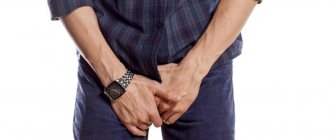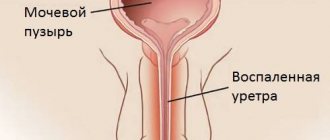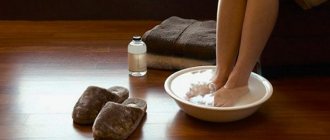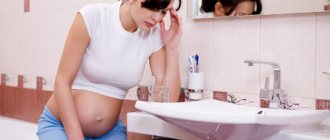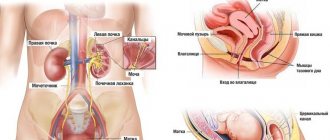2010-12-26 19:58:10
Lera asks:
Hello. 09/28/2010 I had my last period, ending on 10/02. until 13.10. used interrupted coitus daily, from 19.-21.10. brown daub (can't be called anything else) very little on the panty liner. 21.10. I went to see a gynecologist, she looked at me, she said I would have my period soon, a spot from regular sexual activity, and she took a PCR test for hidden infections in the uterus, although I told her that pregnancy was possible and that the fertilized egg was implanting. I went to another city, and on the 11th day of the delay (05.11.) with a positive test, I had an ultrasound (looked at from above) diagnosis of pregnancy 5 weeks 2 days (deformed fertilized egg, corpus luteum+), at an appointment with a gynecologist they advised me to definitely save it, because first pregnancy at 33 years old, group 3 negative, deformed fertilized egg - “that’s nothing to worry about”, Elevit and folic acid were prescribed, in addition, because I had a dry cough and she said I could take a decoction of sage with honey orally. I took it for 3 days, 3 times a day, the cough went away, I also had a severe headache for 2 days and I used Doctor MOM ointment. There were no signs of toxicosis during pregnancy, only increased appetite, sometimes evening nausea and frequent urination. I had regular sex life, but I was under nervous tension. The result of PCR tests is negative for all infections. 04.12. Upon arrival home, I decided to register at the medical center - my condition was good, there was no discharge. showed the previous tests, the gynecologist did not look, she immediately sent me for an ultrasound (transvaginally) - the diagnosis was a frozen pregnancy at 5-6 weeks without an embryo, a fertilized egg of an irregular oval shape. gave directions for cleaning. I turned to another gynecologist (the one who took my test for skr.inf (PCR), she looked at the chair and said everything is fine with you, go for an ultrasound only at 12 weeks. but I decided to go for an ultrasound in 2 days without saying about my diagnosis, everything was confirmed - the diagnosis of a non-developing pregnancy at 7 weeks (uterine size length 68mm, width 60mm, p/z 53mm, fertilized egg 33x26mm of irregular shape, right ovary 29x13mm, left 33x20mm with the presence of a single follicular cavity size 17x12mm , the embryo and yellow could not be visualized, fibroids (for the first time) of a subserous form on the posterior wall of the uterus 18x18 mm). 08.12. I did curettage using the vacuum method, immunoglobulin was not administered, they said “where can we get it for you?”. She spent 7 days in the hospital with almost no discharge I was injected with cefazalin, oxytocin, calcium gluconate, vitamins B1, B6, on the second day I started taking Regulon, there was severe pain, they said that it was because of oxytocin that the uterus was contracting; the histology result was PREGNANCY (???), I was also tested for infections (ELISA) - the result is chlamydia, ureplasmosis, toxoplasmosis negative, herpes simplex virus (1:5), cytomegalovirus (1:14) if I understand correctly (I am taking treatment). On the 13th I was discharged home (they advised me to take nettle and ciprolet) and immediately started bleeding + severe pain (once a large clot with white streaks came out) until the 21st, when I went for an ultrasound, and they diagnosed me with an incomplete abortion, and immediately had a second one manual cleaning. An hour later I went home, and the next day I went to an appointment because... The temperature was 37.3 (there was no pain or discharge) and she prescribed ampicillin. Until today there was no discharge, but today there is severe pain and discharge like menstruation but not heavy. temperature 37-37.3. I only have an ultrasound on the 28th. I wrote in such detail because I have many questions that I cannot find answers to from my doctor. 1. Could the PCR analysis have affected a non-developing pregnancy, and is smear already bad? 2. Was it possible to prescribe treatment for a deformed ovum; could fibroids affect the deformation? 3. Could it have been affected by taking sage and the doctor as a mom, nervous tension, regular sex life, or the fact that the pregnancy occurred as a result of PPA (the latter is absurd in my opinion)? 4. Myoma and cytomegalovirus, given their size (the doctor said that these are possible causes)? 5. What does the histology result mean? 6. How will it affect the fact that immunoglobulin was not administered (father of a 3+ child)? 7. It’s normal that now on the 5th day I started having discharge and pain after repeated cleaning, what is the probability that they didn’t clean again and how many days can the discharge last? 8. How will Regulon affect myoma (I didn’t want to take it, but the doctor insisted on regulating menstruation)?9. The due date at the first ultrasound was determined by obstetrics, although they should have looked at the size of the fetal egg and how is it without an embryo, what’s wrong with the left ovary? 10. When should I start undergoing examination to begin treatment? Please help me figure it out, I really hope for you. This was the first pregnancy, unexpected, but still desired. It was hard to come to terms with the diagnosis. I really want to give birth to a healthy baby. Thank you
The menstrual cycle is the period of time from the beginning of one menstruation to the beginning of the next. It is considered normal when the intervals between periods are the same. Most often it lasts a maximum of 35 days. An extended phase is considered a delay and requires clarification of the cause.
The absence of menstruation always causes anxiety in women, regardless of whether she wants a child or is not yet ready for this event. A delay of several days is not critical and is not a reason for premature conclusions.
The first thing most women try to determine is pregnancy using a test. A negative result is a sign of absence of pregnancy and a reason to worry about the cause of the disruption in the menstrual cycle.
Actions after a negative test result
If the test shows a negative result and symptoms of pregnancy are present, you should proceed as follows:
- wait a few days and try testing again. It is important to carry out the test in the morning and follow the instructions. It is advisable to purchase a test from a different brand;
- test for human chorionic gonadotropin. With the help of laboratory tests, pregnancy can be determined in the early stages;
- If there is a long period of absence of menstruation, you need to seek help from specialists
There are main reasons for missing periods:
- health problems;
- excess weight;
- stress;
- intense physical activity;
- following a strict diet, not eating enough food;
- climate change;
- intoxication;
- heredity
Methods for treating pathological conditions
To restore the outflow of urine, catheterization of the bladder is performed immediately. After making a diagnosis, the doctor thinks through a detailed therapeutic regimen.
The urethra requires special attention before and after childbirth. All women in labor undergo catheterization according to indications. These could be anti-inflammatory pills, medications to increase or improve urine flow, or antibacterial drugs.
Considering all the symptoms, treatment for delay can last quite a long time. Men and women are recommended to adhere to a special diet, perform a number of gymnastic exercises, and also promptly treat any inflammatory and infectious processes.
Broken test
During a delay in menstruation, it is important for a woman to listen to her body. Pregnancy always has signs even in the early stages: nausea, malaise, frequent urination, changes in olfactory and taste qualities, high basal body temperature and many other factors. If you have the first signs of pregnancy and if the test result is negative, the first thing you should do is wait about a week, then retest. It happens, although rarely, that tests are defective or not carried out according to instructions.
//First signs of pregnancy
The main early sign of pregnancy before missed menstruation is hCG (Chorionic Gonadotropin) - this is a special protein that begins to be released 4-5 days after fertilization by the tissues of the embryo from the time of its attachment to the uterine wall, that is, implantation.
After which the concentration of hCG in the woman’s blood and urine begins to increase. An increase in hCG concentration in a blood test is a sure early sign of pregnancy before a missed period. An hCG test is taken 7 days after conception. In a non-pregnant woman, the hCG level is equal to or close to zero. An early sign of pregnancy is an increase in the size of the uterus. Only a gynecologist can detect an enlarged uterus during an examination. An experienced gynecologist during examination even at an early stage of pregnancy and when the earliest signs appear, that is, from the beginning of a delay in menstruation. can determine whether you are pregnant or not.
If you are pregnant in the first week, the following symptoms may indicate this:
The first symptom is delayed menstruation.
The second symptom is an increase in basal temperature. With constant measurement of basal temperature (BT) in the rectum, a persistent increase in temperature (37 - 37.2 C) within 18 days after ovulation may indicate pregnancy. But if you have never measured BT, and now you decide to do so, then a temperature above 37 C against the background of a delay in menstruation indicates a possible pregnancy.
The fourth symptom is nausea. You may feel sick all day long or only in the morning. Nausea can be caused by strong odors (perfume, cigarettes, cafeteria smells), and it may become worse when you are very tired, for example, at the end of the day. If you feel sick to the point of vomiting several times a day, this may be an indication for hospitalization, as severe dehydration is possible.
The fifth symptom is a frequent urge to urinate. A slightly enlarged uterus begins to put pressure on the bladder, the pregnancy hormone (human chorionic gonadotropin) and this affects urination, so you have to go to the toilet more often than usual.
The sixth symptom is weakness, drowsiness, dizziness. The hormone progesterone, the content of which increases during pregnancy: firstly, it dilates blood vessels, which results in a decrease in blood pressure, so feelings of weakness and fatigue may occur; secondly, it has an inhibitory effect on the nervous system, which makes you really want to sit down or lie down.
The seventh symptom is mood swings. Your mood changes dramatically; you become very irritable, whiny, and nervous. Strong hormonal changes in your body lead to mood swings.
Also, signs of pregnancy may be: increased vaginal discharge, severe drooling, unpleasant taste in the mouth (usually metallic), constipation. All these changes are caused by hormonal changes - your body is adjusting to bearing and giving birth to a child.
Frequent urge to urinate is not always a consequence of drinking too much liquid or having a cold. It is especially dangerous when urination is accompanied by a feeling of nausea and headaches. The main thing is not to let such symptoms progress, thinking that this is a consequence of poor nutrition or hypothermia.
Delayed menstruation for medical reasons
If, in the case of a delay in menstruation, there are no signs of pregnancy, and also the woman did not have sexual intercourse during the period of ovulation, it is important to think about the presence of health problems.
With an irregular cycle, doctors, after examination, make a diagnosis of “ovarian dysfunction”, which is rather a state of cycle failure and requires further diagnosis to determine the cause.
Serious gynecological or non-gynecological diseases can provoke a delay.
Symptoms that may accompany frequent urination
Here are the main symptoms accompanying the disease:
- Pain and cramps indicate an acute form of cystitis. In addition, the presence of pathology is indicated by incomplete emptying of the bladder.
- Burning after urination in women is a symptom of a genitourinary tract infection or poor hygiene of the intimate area. A feeling of burning and itching, in addition, may be a sign of individual intolerance to the chosen contraceptive or excessive consumption of spicy foods.
- Fever with constant urge may indicate urogenital tuberculosis or some sexually transmitted diseases.
- Pain in the lumbar region is a common symptom of pyelonephritis, less often it speaks of urogenital tuberculosis.
- Discharge of pus occurs with advanced urethritis, gonorrhea, and chlamydia.
- Women feel discomfort in the pelvic area (lower abdomen) with various gynecological diseases or infections of the genitourinary tract.
- If it hurts at the end of urination, this indicates urethritis or acute cystitis.
- A missed period with frequent urination may indicate pregnancy.
Causes associated with gynecological diseases
- Polycystic ovary syndrome, provoked by hormonal imbalance in the body. The disease occurs as a result of impaired functioning of the ovaries and excessive production of the hormones tarragon and androgen. In parallel with the course of the disease, there is a disruption of the adrenal cortex and the functioning of the pancreas. Symptoms of the disease are weight gain due to increased production of androgens, as well as increased male-pattern hair growth (the area above the lip, legs, armpits). The changes are associated with an excess amount of the male hormone testosterone, which causes disturbances in the female reproductive system. Polycystic disease in rare cases leads to infertility, but is generally successfully treated by taking hormonal contraceptives that balance the level of sex hormones.
- Corpus luteum cyst of the ovary. After ovulation, the corpus luteum forms. If the body experiences stress or hormonal imbalance before ovulation, the corpus luteum continues to function, thereby causing disturbances. The development of the disease is provoked by hormonal imbalances. A course of hormonal therapy is prescribed as treatment.
- Tumor diseases of the genital organs : uterine fibroids, cervical cancer, cyst, inflammation of the uterine appendages. The disease is accompanied by pain in the lower abdomen and atypical vaginal discharge.
- Inflammatory processes in the genitourinary system.
- Failure of the menstrual cycle occurs as a result of an ectopic pregnancy, a frozen pregnancy, or as a result of an early miscarriage.
- The absence of menstruation causes consequences of abortion , such as hormonal imbalance or mechanical damage that occurs during the process of curettage of the uterus. Typically, hormonal levels and the menstrual cycle are restored after a few months.
Drug treatment
You need to understand that antibiotics are substances that always have contraindications and a number of possible side effects. Before starting to use these drugs, it is preferable to conduct a urine test to determine the infectious agent, as well as a study of the resistance of this bacterial strain to different types of drugs and susceptibility to them.
After antibiotic treatment of pain in the lower abdomen during and after urination has been carried out, the woman should submit her urine for bacteriological culture to determine the absence of pathogens.
In order to reduce pain, it is necessary first of all to reduce the consumption of sour foods, spicy foods, too salty and eliminate alcoholic drinks. It is also recommended to take “No-shpu” or “Spazmalgon”. But in no case should we forget that at the first unpleasant symptoms you need to go to the doctor for diagnosis. The doctor will conduct observation, collect tests, and prescribe the correct treatment depending on the symptoms. For example, if an inflammatory process has occurred in the body, the antibiotics Norfloxacin or Cefixime are prescribed.
If the burning sensation is caused by an allergy and itching is present, then in this case it is necessary to take antihistamines such as Tavegil or Zodak.
If urolithiasis has been diagnosed, then in this case it is recommended to drink plenty of alkaline or acidic drinks.
When the nature of the disease is neurological, then in this case it is recommended to use sedative herbal remedies, such as “Fitosed” or “Sedavit”.
If a strong burning sensation occurs during urination or after urination, then drugs with diuretic properties, such as Cyston or Urolesan, are prescribed.
Non-gynecological reasons
- Colds : flu, ARVI.
- Chronic diseases : gastritis, diabetes, kidney and thyroid diseases.
- Taking medications. Many drugs such as anabolics, antidepressants, anti-tuberculosis, diuretics cause side effects as a hormonal imbalance. In such a case, the doctor replaces the drugs with others.
- Taking contraceptive medications. Taking pills on your own, without the supervision of a gynecologist, can lead to delays. In order to protect against unwanted pregnancy, you should not take pills for the entire time. After all, the probability of conception occurs only 5 days a month: 3 days before ovulation and 2 days after the egg leaves the follicle. Therefore, instead of taking large quantities of pills, you can learn to correctly calculate the ovulation period and use protection.
- Early menopause due to hormonal and endocrine disorders. Women usually reach menopause around 50 years of age. At this time, progesterone production decreases, thereby causing menstruation to become irregular.
- Presence of a tumor in the head. An increase in prolactin levels is directly related to the presence of a benign or malignant formation.
- Production of the pituitary hormone prolactin in the postpartum period. If a woman breastfeeds, a transformation occurs in hormone levels. During this period, the body suppresses the likelihood of ovulation. After some time, menstruation is restored. If a woman does not breastfeed, the menstrual cycle returns to normal after about 2 months. In a nursing woman, it is restored after stopping breastfeeding.
Excess body weight as a cause of disorders
Excessive body weight leads to problems at the hormonal level and naturally causes disruption of menstruation. The cause of the failure is estrogen, which accumulates in large quantities in the fat layer. There is a way to check your normal weight by calculating your body mass index. To do this, you need to divide your body weight (kg) by your height (m) squared. If the indicator exceeds 25, you can judge that you are overweight.
If this problem occurs, it is important for a woman to start monitoring the correct diet: exclude sweets, flour, and excessively fatty foods. You should also engage in physical activity, which will help you lose weight. It is important not to overdo it with diets and weight loss, as this can cause even more stress in the body. You need to lose weight, thereby restoring women's health, gradually. There are many services: sports clubs, calorie calculators, communication in forums that help you effortlessly get your body in shape.
The role of stress in menstrual irregularities
Overstraining the nervous system for too long causes a stressful state, which leads to hormonal chaos in the body. Nervous tension affects the functioning of the brain and hypothalamus, which leads to disruption of the ovaries and uterus. To restore your emotional state, it is recommended:
- start leading an active lifestyle. Sports and movement restore and heal the body. Regular walking helps saturate the body with oxygen, which helps increase stress resistance;
- full healthy sleep. The body requires at least 8 hours of sleep to function properly. Otherwise, the level of anxiety increases and depression occurs;
- vitamin therapy. Saturating the body with vitamins helps increase the level of nutrients in the blood, strengthens the immune system and improves the emotional state. In this case, B vitamins and Magnesium preparations are especially effective;
- massage. Practiced to relieve muscle tension, relax and calm the nervous system
Excessive exercise
It is known that professional athletes have problems with the regularity of their menstrual cycle. Excessive tension in the body causes stress and changes in hormonal levels. Fitness classes or morning jogging are not the cause of the delay; only wear and tear causes the failure.
Following strict diets, lack of food
Any diet should be moderate and rational. The body should be evenly saturated with all necessary vitamins and minerals. Otherwise, the lack of nutrients and excessive thinness are perceived by the body as an emergency situation in which pregnancy is undesirable. The critical weight, established by experts, is 47 kg, upon reaching which irreversible transformations sometimes occur in the body. Menstruation may not only be delayed, but also disappear completely.
Intoxication of the body
Harmful chemicals, as well as tobacco, alcohol, and drugs have a detrimental effect on the reproductive system, which leads to delayed menstruation. You can restore your hormonal levels by eliminating contact and use of harmful substances from your life.
Climate change
Sudden changes in climate and time zones cause stress and cause delays. The cause of the failure may be excessive amounts of ultraviolet radiation due to frequent and prolonged exposure to the sun.
Heredity
Often problems with the cycle are inherited. If the mother previously had similar problems, then it is natural that the daughter will sooner or later encounter disruptions in her cycle.
Prevention measures
To prevent the development of frequent urination, accompanied by nausea, and relapses of this condition after completion of treatment, you will need to eliminate all provoking factors from your lifestyle. To do this, you must follow the following rules:
- exclude coffee from the diet, especially at night, completely give up alcohol;
- wear underwear made of natural cotton fabric, remember the rules of intimate hygiene and do not use other people’s personal belongings;
- Avoid visiting saunas, steam baths, and taking hot baths, as they enhance kidney function and urine production.
Frequent urination and nausea are not always a manifestation of a dangerous pathology. In the absence of pain, the causes may be normal physiological reactions in the body. You need to be wary of additional symptoms. In such a situation, examination and diagnosis are required.
It is forbidden to self-medicate if you have frequent urge to go to the toilet and nausea. We need to increase the rhythm of life: walk more, run in the morning, do exercises. Drink mineral water, which improves the condition of the digestive system. It is also important to remember about the proper functioning of the immune system, take vitamins, and review your diet. If all this is done, and the problem persists, then full treatment is required as directed by a specialist.
Frequent urination is a symptom of many diseases and conditions, and can lead to sleep deprivation and affect your ability to work, exercise, or perform daily tasks. For people who suffer from nocturia, or frequent urination in the middle of the night, the problem can affect their quality of life, leading to fatigue, mood changes, changes in appetite and a foggy mind.
Usually, by dealing with the underlying condition that is causing frequent urination, you can manage and eliminate this very uncomfortable symptom. Knowing the potential causes of frequent urination can help you determine the cause of the problem and choose the right treatment.
There are also natural treatments for frequent urination that can help you improve pelvic muscle strength, avoid food triggers, and rewire your bladder to use the toilet less often.
Actions in case of absence of menstruation
In case of a delay in menstruation and if the test reading is negative, a woman should consult a doctor. For an accurate diagnosis, an ultrasound and blood test are prescribed. After this study, it is possible to detect endometriosis or polycystic disease.
It is also necessary to exclude the possibility of tumors in the brain and ovaries; for this, CT and MRI are prescribed.
If the gynecologist has not identified the cause, perhaps the problem lies in the state of hormonal levels. The woman is referred for examination to an endocrinologist. At the same time, you need to take additional blood and urine tests, and undergo an examination of your kidneys and adrenal glands. It is recommended to visit a nutritionist and psychotherapist.
Medications
You can speed up the process of cycle restoration with the help of medications: Duphaston, Pulsatill. It is recommended to use such drugs only after the recommendation of a doctor. Hormonal drugs can cause the onset of menstruation and thereby regulate the cycle within a few days.
Folk remedies
There are also folk remedies to speed up the onset of menstruation: using medicinal infusions of mint leaves, elecampane root, chamomile flowers, and valerian. Moderate exercise and a hot bath are also recommended. It is important to remember that the onset of menstruation does not solve existing health problems.
Timely diagnosis of the disease and treatment contribute to the restoration of the menstrual cycle in a short time.
Video why periods disappear
One of the important indicators of a woman’s health is the frequency of urination. It is believed that during normal functioning of all organs, fluid is removed from the bladder up to 7 times a day. In women, frequent urination and delayed menstruation can be the first symptom of changes in the body caused by various reasons.
Traditional treatment
Along with traditional medicine, you can also use folk remedies, but medical supervision is also necessary here. The following methods will help you with this:
- Treatment with lingonberry leaves. To prepare this remedy, you will need a large spoon of raw materials, half a liter of water at room temperature and allow time to brew (about 30 minutes). Later you will need to bring the product to a boil; cooking will take about a quarter of an hour. Ultimately, the entire volume of liquid should be reduced by half. The prepared broth must be cooled and strained. You need to take one tablespoon several times a day. This remedy will help cope with such an unpleasant phenomenon as cystitis.
- Treatment with bear ears. To prepare such a useful infusion, you will need a large spoon of herbs. It will need to be poured with 250 ml of boiling water and allowed to brew in a steam bath for half an hour. Then you will need to strain and cool the product. Later you need to add a little boiled water to obtain the original volume. The product should be consumed 175 ml several times a day.
- Treatment with dill seeds. To prepare an effective infusion, you will need a large spoon of seeds. You need to put them in a thermos and add one glass of water at room temperature. After 20 minutes, you can start using the solution. It is advisable to use 100 g of the product several times a day. This miracle infusion will help reduce pain at the end of urination.
- Treatment with cucumber seeds. Such a product will need to be reduced to a powder state. Later you need to take two medium spoons of raw material and pour in a whole glass of boiled water. Prepare the solution for 20 minutes over low heat. The strained solution should be consumed half a glass several times a day. It is advisable to use the product 30 minutes before meals.
- Lettuce treatment. It is absolutely easy to create a miracle infusion from this plant: you will need half a medium spoon of the leaves of this plant, then you need to pour in a glass of boiled water and let it infuse for a couple of hours. You need to consume one large spoon several times a day.
Experts have long recognized the effectiveness of many folk remedies, but doctors remind that self-medication is unacceptable even when you use natural remedies. It is necessary to carry out a course of treatment for pain in the lower abdomen during urination in women under the supervision of a doctor.
Source
There is no reason to worry
The most pleasant and harmless reason for delay, which is accompanied by frequent trips to the toilet, is pregnancy. During this period, the volume of fluid in a woman’s body increases. And the kidneys, which work in an intense mode, quickly remove it. In addition, the fetus grows in the uterus, and as a result, this organ puts pressure on the bladder.
If trips to the toilet become more frequent, and your period still doesn’t come, then it’s worth remembering whether there was an emotional shock the day before. In addition, the woman could have become very cold. These factors lead to bladder spasm. Its volume decreases, so it has to be emptied more often.
Frequent visits to the toilet when delayed, which do not cause pain, occur after drinking drinks rich in caffeine and alcohol. In addition, juicy vegetables and fruits, herbal infusions or medications that have a diuretic effect can trigger frequent urination. Therefore, there is no cause for concern.
If there is a delay and the test shows a negative result, you should look for the cause of frequent urination together with a specialist. This is necessary so as not to trigger a serious pathology.
Eliminating problems with urinary retention and frequent urination
Since various factors contribute to delayed menstruation and frequent urge to urinate, it is first necessary to establish the exact cause. And treatment is prescribed based on the diagnosis.
First of all, it is necessary to exclude or confirm pregnancy. In cases where the delay already exceeds several days, the test shows one line, and the number of urinations has increased, it is necessary to undergo an examination by a gynecologist, take an analysis for the level of hCG in the blood and, preferably, undergo ultrasound control.
If you discover that you are not pregnant, you should contact your physician, who will refer you to see specialists who treat this disease. If the cause is hormonal imbalance, the gynecologist prescribes medications that help normalize hormone levels.
Infectious and inflammatory diseases are treated with medications that eliminate the inflammatory processes that have begun, as a result of which the condition of the body and the functionality of the urinary organs are normalized.
Ovarian cysts are treated both medically (oral contraceptives) and surgically (laparoscopy and laparotomy). After eliminating the cystic formations, the frequent urge to go to the toilet disappears, and the menstrual cycle is restored.
Hormonal changes and more
Almost all processes in the human body are regulated by hormones. Therefore, any fluctuations in their level invariably affect well-being. In women, hormonal levels change constantly and affect the frequency of urination. This is especially noticeable during pregnancy, as well as when ovarian function begins to fade in the body and a woman enters menopause.
For many representatives of the fair sex, premenstrual syndrome can also be associated with frequent trips to the toilet. The low level of progesterone, which is observed in women during this period of the cycle, promotes increased expulsion of fluid from the body. This means that you have to go to the toilet much more often than usual.
Another reason for frequent urination is taking hormonal medications. But if they are prescribed by a doctor after a thorough examination, then the likelihood of such side effects as delayed menstruation or frequent urination is practically reduced to zero.
Termination of pregnancy, regardless of whether it was performed surgically or with the help of medications, is always a severe shock for a woman’s body. After this, the hormonal system should return to normal for several months. But this is not the only problem - many complications often arise after abortions, including cystitis. With it, urination occurs very often and is associated with painful sensations.
There are a number of factors contributing to the development of cystitis after abortion:
- chronic pathologies of the excretory system;
- latent forms of sexually transmitted diseases;
- blood stagnation in the pelvic organs;
- low tone of the bladder sphincters;
- hypothermia;
- violation of personal hygiene rules.
When a woman urinates frequently for several days after giving birth without experiencing discomfort, this is normal. Thus, excess fluid is removed from the body. But frequent trips to the toilet and only a couple of drops of urine are a reason to consult a doctor. Perhaps inflammation of the urethra or cystitis has begun.
In addition, after childbirth, the tone of the muscles lining the pelvic floor is reduced; it does not exert sufficient pressure on the bladder and urinary tract. Therefore, many women feel discomfort when a certain amount of urine is involuntarily released when sneezing or laughing.
Chronic diseases of the genitourinary organs in women, including urethritis, pyelonephritis, adnexitis and a number of others, can cause frequent urge to urinate. In order to accurately establish the cause of the disease and cure it, it is necessary to consult a specialist and undergo an examination.
Frequent urination in women: causes and treatment
Normally, the average woman needs to empty her bladder up to eight times a day.
This frequency of urges allows the body to promptly remove accumulated urine without causing any particular inconvenience: the need to visit the toilet appears every few hours, which does not interfere with either the work process or rest. But sometimes the situation changes.
Many people notice excessively frequent urination: in women, such a symptom can either be completely harmless or indicate the presence of health problems.
Almost all people have noticed that in cold weather the desire to urinate occurs much more often than in warm weather. What is this connected with? Hypothermia provokes more active urine production, which is why a woman wants to pee constantly. This effect is explained by the following mechanisms:
- stimulation of the sympathetic nervous system caused by cooling the body leads to tachycardia, increased cardiac output, spasm of small arteries and increased total peripheral vascular resistance;
- In order to reduce heat loss, the body provokes a spasm of blood vessels in the muscles and skin, while the vessels of the internal organs (kidneys, heart, brain) dilate. As a result, blood flow to the kidneys increases, which causes increased filtration of urine.
As a result of internal processes caused by cold, metabolism accelerates and more so-called metabolic (endogenous) water is formed in the body. This is what the body has to work hard to eliminate.
In hot weather, some of the excess fluid is excreted through sweat. But such “technology” is not available to the body at low air temperatures, which is why constant urges arise. If urination is painless and is not accompanied by any additional symptoms (for example, discharge of blood or pus), then there is nothing to worry about: as soon as the body warms up, its “behavior” will return to normal.
All people react differently to stress. Regarding the process of urination, two main ways the body “responses” to experiences can be distinguished:
- Inability to urinate.
- Constant urge to do something small.
Many women “choose” the second type of response. As a rule, these are calm individuals, vulnerable to external evaluation and worried about the impression they make on others.
Frequent urination during stressful moments is associated with the influence of emotions on the parasympathetic part of the autonomic nervous system, which is responsible for contracting the walls of the bladder and relaxing the sphincter.
If the excitement is strong, the organ also begins to “worry” and sends signals about the need for emptying.
Most often, this is observed before exams, public speaking, interviews and dates.
From the point of view of physical health, the woman has no problems, but with an excessively strong reaction to stress, serious psychological pathologies may appear.
Products that have a diuretic effect cause increased urination, which explains the constant urge. Frequent short hikes are often triggered by a diet that includes any of the following:
- Ginger or green tea with lemon.
- Coffee and other caffeinated drinks (Coca-Cola, energy drinks).
- Alcoholic drinks, especially beer.
- Natural juices (from cranberries, lingonberries, celery, parsley, carrots, citrus fruits).
- Bitter chocolate.
- Some fruits, vegetables and berries - melons, watermelons, cucumbers, tomatoes, pumpkin, carrots, lemon, cranberries, viburnum, rowan, lingonberries, blackberries, dried apricots, apples, parsley, celery.
The diuretic effect is simply a feature of the products. As long as a woman uses them, the urge to urinate will not go away. Separate mention should be made of all kinds of teas and supplements for weight loss. As a rule, they all provoke increased removal of water from the body and force the bladder to regularly send signals about the need to empty.
The female body periodically encounters key “thresholds” for it. At this time, hormonal changes occur, as a result of which the urge to urinate becomes more frequent. Means:
- menstruation (increased urination, as a rule, is observed several days before the onset of bleeding);
- pregnancy (increased urges may occur immediately after the embryo is conceived; subsequently, their daily number increases, as hormonal changes add to the pressure of the uterus on the bladder);
- menopause
In all these situations, constant urination is considered normal, as it is caused by natural processes occurring in the body.
Some health problems include frequent urination among the main symptoms. The most common pathologies include:
- Cystitis. Inflammation of the bladder is accompanied by pain when urinating, discomfort in the lower abdomen. The urges are very strong and difficult to tolerate.
- Urethritis. It has symptoms similar to cystitis, but in addition, discharge from the urethra can be observed.
- Pyelonephritis. Inflammatory kidney damage is characterized by acute pain in the lower back, fever up to 40 degrees, nausea, vomiting. In the chronic course of the disease, the symptoms are less pronounced, but frequent urination persists.
- Urolithiasis disease. The presence of stones in the internal organs does not reveal itself at all at first. But at the moment of physical activity, the stones can begin to move, provoking a severe attack of pain. Neoplasms that irritate the bladder also cause frequent urge.
- Prolapse of the uterus. The pathology is associated with weakening of the muscles and ligaments that hold the organ. Regular visits to the toilet are accompanied by constipation, vaginal discharge, and pain in the lower abdomen.
- Uterine fibroids. A benign tumor, growing, begins to put pressure on the bladder, causing a strong urge. Other symptoms include menstrual irregularities and a sensation of a foreign body inside.
- Heart failure. Damage to the coronary vessels is associated with poor blood circulation and swelling of the legs. When a woman goes to bed, water returns to the bladder, causing nighttime urge.
- Diabetes. Both the sugar and non-sugar forms are accompanied by copious amounts of urine. The following signs should alert you: very strong thirst, itching, inflammation of the skin, and excessive appetite.
- Overactive bladder. It often has a neurogenic nature, that is, the syndrome is associated with a malfunction of the nervous system. Women experience a constant urge to urinate all the time for no apparent reason.
At the slightest suspicion of the presence of the disease, you must consult a doctor. It is not recommended to do anything on your own.
You can get rid of frequent urination only by eliminating the cause:
- if you are hypothermic, you need to warm up;
- if you are overly excited, you should learn to relax through meditation, breathing exercises, and visualization;
- with a “diuretic diet” it is recommended to review your menu;
- if your hormonal levels change, you can consult a doctor for advice and prescribe special medications (if necessary);
- If symptoms of the disease occur, you must make an appointment with a specialist and undergo appropriate treatment.
In most cases, constant urges are not dangerous. If there is a suspicion of health problems, there is only one way - a visit to the doctor.
Frequent urination in women is not always a cause for concern.
Firstly, the frequency of emptying the bladder is strictly individual. Secondly, increased frequency of urges may be caused by changes in diet and other reasons. In this case, frequent urination usually lasts less than 2 days and is not accompanied by any other painful symptoms.
Seeing a doctor is necessary if a woman experiences serious discomfort, while simultaneously noting pain, a change in the amount of urine produced, and a disturbance in the rhythm of life.
Causes of frequent urination in women
The conventional norm is to urinate up to 10 times a day (1-2 times a night). However, increased frequency of urges is not a pathology if a woman:
- drinks large amounts of liquid and coffee (has a pronounced diuretic effect), took alcohol the day before;
- takes diuretics;
- trying to lose weight with the help of special preparations (often containing diuretic herbs);
- experiences hormonal changes during menopause;
- is elderly (after 60 years, 2/3 of urine is excreted at night, which is associated with physiological aging of the body);
- experienced a stressful situation (“bear” disease);
- was in the cold (hypothermia causes spasm of the smooth muscles of the bladder).
In these situations, women experience a frequent urge to urinate without pain, which resolves on its own after eliminating the causative factor (withdrawal of diuretics, normalization of the drinking regime, etc.).
If frequent urination is observed for more than 3 days and is accompanied by discomfort, a number of diseases should be excluded.
Pathology of the urinary tract
Every third representative of the fair sex reports frequent urination caused by inflammation of the bladder or kidneys.
Urethritis - an inflammatory process in the urethra - is considered in most cases a female disease. The short and wide urethra is an entry point for infections.
Cystitis is a common disease characterized by inflammation of the bladder mucosa. Frequent urge to urinate with pain in women is accompanied by pain in the lower abdomen (pulling, cutting nature).
In advanced cases, changes in urine are detected: blood, cloudy color due to the appearance of protein and an increase in leukocytes.
Pyelonephritis - the development of inflammation in the kidneys - is accompanied by hyperthermia up to 39-40ºC, signs of intoxication (weakness, nausea) and lower back pain, sometimes radiating to the leg. Pus and blood elements are detected in the urine. Chronicity of the process is accompanied by hypertension.
Urolithiasis gives characteristic symptoms: urination suddenly stops, although the feeling of fullness of the bladder remains.
Gynecological problems
Diseases of a woman's reproductive organs often cause retention and the accompanying frequent urge to urinate. Among them is polycystic ovarian disease, in which growing follicles fill with fluid and turn into cysts, putting pressure on the bladder. And hormonal shifts contribute to delays in menstruation.
After a mature egg leaves the follicle, the corpus luteum begins to form, in which progesterone is actively synthesized. This formation can also accumulate fluid and transform into a cyst, which causes retention and frequent urination.
An ectopic pregnancy occurs due to the fact that the fertilized egg is not implanted in the uterine mucosa, but is attached to the fallopian tube or to the isthmus of the tube. A woman experiences all the symptoms of pregnancy associated with hormonal changes, including increased urination. But the growth of the fertilized egg can lead to pipe rupture. This condition is extremely dangerous for a woman’s life and requires immediate attention to the hospital.
Sometimes the fertilized egg is pushed into the abdominal cavity (without rupture of the tube), during which the woman feels pressure in the lower abdomen, frequent urge to urinate, and paroxysmal pain in the iliac region. Nausea, vomiting, and hiccups may occur.
Frequent, painful urination should be a reason to visit a doctor. After all, it may be caused by one of the sexually transmitted diseases. These include chlamydia, trichomoniasis, mycoplasmosis, syphilis and gonorrhea. Their symptoms also include:
- yellow-green or bloody discharge;
- pain in the lower abdomen;
- pus from the urethra.
The kidneys, being the main organ of the excretory system, are sensitive to changes in fat, protein and carbohydrate metabolism in the body. Therefore, fluctuations in a woman’s body weight, downward or upward, are reflected in their work and frequency of urination.
Normal urination: what is it?
Kidneys in normal condition carry out filtration processes, removing harmful elements from the body along with fractions of urinary fluid. Normally, a man should urinate 3–6 times during the day. For girls (older women) the indicators are somewhat different. Due to the structure of the organs of the urinary system, women can visit the toilet 6–8 times a day.
The urge to go to the toilet may occur less frequently if a person has consumed too little liquid during the day. Frequent urination can be explained in a similar way: too much liquid has been drunk during the day. Such conditions are physiologically justified and understandable, are exclusively short-term in nature, and are not accompanied by other pathological symptoms or unpleasant sensations.
During the day, the body of a healthy person secretes about 1.5 liters of urinary fluid. The amount of urine increases not only if large amounts of liquid are consumed, but also if the diet contains a lot of foods rich in liquid (fruits, vegetables, liquid dishes). Less urine is excreted during excessive sweating and stool disorders (diarrhea).
Pathologies of internal organs
A condition in which you have to go to the toilet “in a small way” more often than during the day – nocturia. It occurs not only during pregnancy, but also in connection with some serious diseases of internal organs and systems.
In case of heart failure, frequent urination may be the first sign. It is accompanied by symptoms such as attacks of suffocation at night, swelling of the extremities, and wheezing resembling gurgling in the lungs.
Diabetes mellitus is often accompanied by a frequent urge to urinate. This disease is indicated by severe thirst, itching of the genitals, a feeling of numbness in the limbs, sudden weight loss (type I) or weight gain (type II).
The reason that menstruation is delayed and you often want to go to the toilet can be problems with the genitourinary organs. Sometimes they are inflammatory in nature, such as pyelonephritis, glomerulonephritis. Or they can be caused by the presence of stones in the kidneys or bladder. Such diseases require treatment from specialists - a nephrologist and urologist.
Frequent urination and nausea
- Cystitis. Due to anatomical features, the disease occurs three times more often in women than in the stronger sex. The initial stage does not cause pain, but later cystitis brings severe discomfort to the girl. A characteristic sign of the disease is that the bladder may seem unemptied even after urination. As the disease progresses, the urine becomes cloudy.
- Pyelonephritis. Frequent urination in adult women may indicate the development of kidney disease - chronic pyelonephritis. Sometimes the disease is accompanied by an unpleasant pulling feeling in the lumbar region. If the pathology worsens, the body temperature begins to rise, nausea and weakness appear, and blood or pus can be seen in the urine.
- Bladder stones. Constant urge in women can be a sign of urolithiasis. The desire to empty the bladder occurs suddenly and unexpectedly, usually after playing sports or shaking in transport. During urination, a woman with urolithiasis notices interruptions in the flow and, in some cases, feels discomfort in the lower abdomen.
- Weak muscle corset of the bladder. The main symptom is frequent urination with a small volume of urine released. Women feel a sharp, urgent urge to run to the toilet. This pathology is congenital, so the only way to solve the problem is to train the abdominal muscles.
- Overactive bladder. The increase in nerve signals is interpreted by the brain as the urge to urinate. Therapy of the disease is aimed at suppressing the pathological excitability of the nervous system.
- During pregnancy. In the early stages, an increased urge to urinate is caused by changes in a woman’s hormonal levels and an increase in the size of her uterus. In the second trimester, the desire to constantly empty the bladder is not physiologically justified, and may indicate the development of pathologies. At the end of the term, the pressure of the baby's head and the enlarged uterus on the bladder increases, so the desire to empty it arises more often than usual.
- Gynecological pathologies. Excessive urine discharge can be a symptom of uterine fibroids (a benign tumor that puts pressure on the bladder). As the disease progresses, the menstrual cycle may be disrupted. If a woman has a congenital disorder - the uterus is prolapsed, frequent urges are caused by displacement of the pelvic organs.
- Endocrine pathologies. Often, constant trips to the toilet indicate diabetes. At the same time, the following symptoms appear: fatigue, itchy skin, thirst. If a woman is constantly thirsty, this may also indicate diabetes insipidus, which is characterized by an increase in the volume of urine excreted to 5 liters per day.
- Cardiovascular diseases. With cardiac insufficiency, in addition to an increase in the frequency of urination, skin swelling occurs.
- Physiological factors. Frequent causes of increased urine output in women are diet, anxiety, stress, and oxygen starvation of cells.
- Taking medications. Excessive urination is sometimes provoked by taking diuretics prescribed for the treatment of gestosis, hypertension or edema.
Frequent urination in men should not always be considered normal. Even if the frequent urge to empty the bladder is not accompanied by discomfort, discharge and other alarming symptoms, the patient should consult a specialist.
Causes
All causes of frequent urination in men can be divided into 2 groups. The first includes physiological ones, in most cases associated with errors in diet or stress. The second group includes pathological causes associated with various diseases of the genitourinary and other systems.
The reason to see a doctor should be discharge from the urethra in the morning, the inability to empty the bladder without pain, and some other symptoms that cause discomfort.
Frequent urination can occur equally in both adults and children; both sexes are susceptible to the problem. It is believed that we are talking about pollakiuria if during the day a person needs to empty at least 8-10 times. In this case, the interval is less than 2 hours.
- Normal urination
- The main causes of pollakiuria
- Physiological
- Pathological
- Diseases of the urinary system
- Diseases of the reproductive system
- Diseases of the cardiovascular system
- Diseases of endocrine origin
- Taking medications
- Other reasons
- Predisposing factors
- Symptoms to watch out for
- Features in men
- Features in women
- Why does pregnant women urinate more often?
- What tests need to be done?
- How is the treatment carried out?
- Medicines
- Diet and nutrition
- What will help at home?
- Preventive measures
Naturally, urine output is largely influenced by the volume of liquid you drink. If it increases significantly, for example, due to hot weather, the outflow also becomes more frequent and sometimes occurs 15 times a day. This is not a disease, as it is caused by physiological reasons.
Before taking action, you need to be sure that there is a urinary disorder. Therefore, you should consider what indicators are considered normal.
| Floor | Age category | Urinary frequency | Daily volume in ml |
| Child | 0–28 days | 20–25 | 150–450 |
| 1–12 months | 8–10 | 300–800 | |
| 1–5 years | 5–8 | 500–1000 | |
| 5–10 years | 6–7 | 650–1200 | |
| 10–14 years | 5–6 | 1000–1500 | |
| Woman | 4–8 | 800–1600 | |
| Man | 4–8 | 800–1600 |
However, it is worth remembering that there are no strict indicators of urination frequency and daily fluid intake. The norm is the average data. But in practice, everything depends on individual characteristics, drinking regimen and other conditions. Therefore, even with frequent urine excretion, it cannot be said that pathology is present.
Frequent urination, which is accompanied by thirst, painful cramps in the lower abdomen, or changes in the color and smell of urine, is a cause for concern. Do not delay visiting your doctor for diagnostic tests.
At a certain age, a boy (less often a girl) suddenly increases the number of urinations. The child can go to the toilet every 20-25 minutes without feeling pain, burning or stinging. This condition usually develops in children 4-6 years old, when the baby already knows how to control his bladder.
The causes of frequent urination in children are worms, in the vast majority of cases pinworms.
Experienced pediatricians know about this feature of the baby’s body and always write out a referral for stool testing for helminthic infestation. After treatment with anthelmintic drugs, along with parasitic worms, urinary disorders also disappear.
The provoking factor for pollakiuria is a stressful situation. But the pediatric urologist still makes diagnostics to detect an inflammatory focus in one of the parts of the urinary system.
The baby will need to urinate, and the doctor will check whether the bladder is completely empty. Treatment of daytime frequent urination syndrome in children is based on eliminating the cause of the pathology.
In some cases, it may be enough to visit a child psychologist several times.
A parent can immediately understand that a child is developing a disease if they notice the following signs:
- going to the toilet is accompanied by pain and cutting in the urethra;
- there is pain in the lower abdomen and lower back;
- the nature of urine changes, flakes, sediment, and foreign impurities appear in urine;
- an adult child may urinate in his sleep;
- severe weakness, malaise;
- sweating;
- elevated temperature.
These symptoms indicate the development of various diseases that require urgent treatment.
The urologist makes a diagnosis through a survey and digital examination of the rectum. It may be canceled if the pain is severe.
A microscopic or biochemical examination of urine and a blood test (general) are prescribed. For accuracy, it is recommended to use ultrasound examination of the bladder, prostate and kidneys.
Frequent urination in children can serve as a signal of developing diseases, so a pediatric urologist conducts a thorough diagnosis. The doctor will examine the child, interview the parents, and examine the medical history. Laboratory tests of urine and blood are required. Making a preliminary diagnosis is possible at the stage of studying the test results:
- urine: an increased concentration of proteins, uric acid and its compounds, leukocytes indicates an inflammatory process in one of the organs of the urinary system;
- blood: a low level of hemoglobin, a small number of platelets indicate a general deterioration in the baby’s health.
Laboratory assistants will inoculate a biological sample in a nutrient medium to determine the type of pathogenic agent of cystitis, glomerulonephritis, pyelonephritis in boys and girls. In this way, the sensitivity of viruses and bacteria to antimicrobial drugs is also determined. Sometimes a urologist recommends collecting 24-hour urine to determine the location of the infectious focus.
To differentiate pathologies, children undergo instrumental examinations of the pelvic organs:
- computed tomography;
- X-ray;
- cystoscopy;
- ultrasonography;
- magnetic resonance imaging.
These examination procedures are prescribed to children depending on their age. MRI and CT scans should not be performed on newborns or small children. Boys and girls are unable to remain still throughout the entire procedure. Diagnostics makes it possible to detect pathology in a timely manner and begin its treatment at an early stage, when cells and tissues have not yet undergone irreversible changes.
Quite a lot of women face such a delicate problem in the modern world. The reasons for frequent urination in women without pain can be very different, and therefore there is no need to compare your case with a similar one from a friend. This condition does not cause any particular inconvenience, so women do not always rush to visit the doctor, which is a mistake.
Normally, a woman visits the toilet for minor needs 10-13 times per day. If this figure is much higher, then this is the first signal for concern. You should be especially wary when urination is accompanied by pain in the lower abdomen.
What are the causes of nausea when urinating?
Any pain in the body needs close attention from a person, since it is a mechanism for the body to express problems in its functioning. Depending on the location of the pain, you can determine the approximate pathology that caused it:
- tingling in the right side and periodic abdominal cramps may occur due to ulcers, gastritis, urolithiasis or cholecystitis;
- pain in the renal system occurs with pyelonephritis, inflammation in the appendix or tumors in the kidney;
- a feeling of heaviness in the lower abdomen indicates urethritis, cystitis;
- with pain in the vagina and perineum, diseases of the venereal type are most often detected;
- pain and discomfort in the ovaries indicates a cystic lesion;
- Unpleasant sensations in the testicles in men can occur with prostatitis or mycoplasmosis, chlamydia.

